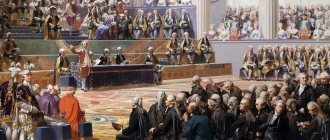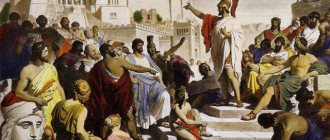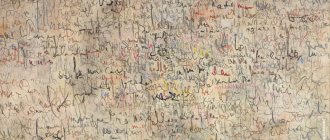History of origin
Rhetoric arose in the 5th century BC. Empedoclonus, according to Aristotle, is considered the inventor of a new form of art. And the first work in rhetoric is a treatise by Empedoclonus’ student, Corax.
Unfortunately, the treatise has not survived to this day; its contents became known from the works of ancient writers. Corax was a trial lawyer and was a favorite of the Syracusan tyrant Heron.
He was the first to formulate a definition of rhetoric: “Eloquence is the worker of persuasion.” He did not stop there and defined the composition of oratory, which is still used today, dividing it into main parts:
- Introduction.
- Offer.
- Presentation.
- The proof is in the struggle.
- Conclusion.
Corax expressed the opinion (and adhered to it) that the goal of the speaker is not to reveal the truth, but to clearly and convincingly speak with the help of sophisms (deliberately false conclusions).
Socrates and Plato
Perhaps the two most famous orators of Ancient Greece, whose works and statements can still be found today. According to Plato, who considered himself more of a scientist than an orator, the art of eloquence is based on knowledge of the truth, and not on the correct construction of sentences and the use of phraseological units. Only if a person develops comprehensively will he be able to understand the nature of human souls and begin to convey the word to them.
As for Socrates, the scientist’s most famous work is considered to be a dialogue called “Phaedrus,” in which the famous philosopher discussed the meaning of life with a young man named Fedor. The author adhered to the theory that before you begin to convey your opinion to your interlocutor, it is necessary to study it in detail, like any subject. After this, you can find the right levers, by pressing which you will inspire trust and respect in your interlocutor.
Founders
The next founder of rhetoric is considered to be Corax’s student, Lysias. He continued to develop, like his teacher, a system of sophistic proofs.
He especially praised the “crocodile” (logical paradox) of his teacher. He also had students. Part of the teaching methodology was to memorize passages from famous speeches of famous public people.
One of his students was Gorgias of Leontius. He went further than his teacher. He was able to convincingly turn the truth around in his speeches. For example:
- pass off the old as new, and the new as old;
- express completely contradictory views about the same thing.
Gorgias was sure that the most important thing is not the truth, but the probable. He had students and followers. His teaching method did not differ from the method of Lysias, his teacher - memorizing passages from the works or speeches of the best speakers.
His legacy left an interesting work - the treatise “On a Decent Occasion.” In it, Gorgias teaches how serious arguments can be destroyed by mockery, and mockery can be answered with dignity.
From the school of Gorgus came world-famous orators: Paul, Agrigentius, Licymnius, Thrasymachus, Even, Theodore of Byzantium, Protagoras, Prodicus, Isocrates.
The next famous names for history in the field of rhetoric were: Aristotle, Cicero, Quintilian.
Who is a speaker?
Before we begin to familiarize ourselves with the main material, let's first understand who the speaker is and what he does. If you turn to the dictionary of the modern Russian language, you can find several definitions of this term, each of which carries a certain amount of truth. For example, speakers today are people who study the art of eloquence at a professional level.
Also, many modern writers use this term in their works, presenting to the reader characters who have a certain gift of speech. In short, a speaker is a person who delivers a specific speech. In the following sections you will find the names of ancient Greek speakers and their works, which are also used by the modern generation.
The importance of ancient rhetoric for world culture
Rhetoric originated and developed in Ancient Greece, then its teaching went beyond the country and spread to Ancient Rome, then to Western Europe, then to Eastern Europe, to the Slavs.
Let's say more, oratory has not lost its relevance today. Throughout the development of mankind, the works of ancient speakers have been and are being studied.
The talent of persuasion and the skill of oratory was and is in demand at all times and anywhere in the world on Earth.
- The works of the masters of ancient rhetoric were and are the subject of controversy and admiration.
- They became the foundation for the emergence of new sciences: philosophy, logic, linguistics, functional stylistics, speech culture.
- They are studied at universities in the faculties of philosophy, linguistics, psychology and jurisprudence;
- Rhetoric has become part of a quality liberal arts education.
- Eloquence courses are very popular, which help to acquire persuasion skills, increase the self-esteem of an individual, and cure “tongue-tiedness.”
Demosthenes
An ancient Greek orator and part-time teacher of eloquence, who studied with Socrates and Plato for several years. Demosthenes’ speeches are also called “mirrors of character,” since the speaker was able to almost accurately recognize what was hidden in the soul of his interlocutor and choose the right words that he would like to hear. Demosthenes himself did not consider himself a rhetorician and did not like to decorate his words with invented expressions that an ordinary person could not perceive.
People loved the speaker for his fairly simple arguments and examples, which were imbued with wisdom and nobility. Also quite an interesting fact is that Demosthenes had a rather weak voice and short breathing, so there was always complete silence during his lectures so that the students could hear the teacher. By the way, perhaps you found the question in scanwords: “Ancient Greek speaker who stuttered - 8 letters?” If so, then Demosthenes was the answer.
Rhetoric of Ancient Greece
The period of the birth of the art of rhetoric falls on the period of Athenian democracy.
This was due to the fact that a citizen who went to court had to construct his own speech for defense or prosecution. It was the ability to formulate one’s thoughts, convincingly explain and prove that influenced the outcome of the decision of this court.
At that time, mastery of oratory was so valued that it made it possible to make a brilliant political career. Because in governing the state the opinion of the People's Assembly and the Council of Five Hundred was of great importance.
The creators of the art of rhetoric are considered to be the sophists, who did not particularly possess moral and ethical principles. But they had a talent for eloquence and the ability to control and manipulate the consciousness of the crowd.
The founder of high rhetoric was Socrates. He believed that the sophists deliberately used false reasoning, and became an ardent opponent of their teachings.
He based his teaching on the use of true concepts and logical evidence in argument. I was sure that this was what would ensure real victory.
Aristotle made a huge contribution to the development of rhetoric by systematizing the knowledge available at that time. One of his works is the treatise “Rhetoric,” consisting of 3 books.
Aristotle deduced the basic laws of rhetoric, which are still fundamental today for any public speaker.
Interesting for history is Demosthenes, a student of Socrates and Plato. He had tongue-tiedness and a fear of crowds. However, he managed to overcome these obstacles thanks to his determination and perseverance.
His primitive method of dealing with sly tongues is still used by students of the beautiful word. These are pebbles in the mouth.
During the Middle Ages, interest in rhetoric waned and was renewed with renewed vigor in the 19th century. Our compatriots made a huge contribution to its development: M.V. Lomonosov, M. Montel.
An example of oratorical talent is L. Trotsky. Nowadays, rhetoric continues its development, constantly turning to the works of the masters of oratory of Ancient Greece.
Related posts:
- What is "War and Peace" about? Summary of the novel “War and Peace” by chapters. All answers...
- Rhetoric - traditional and modern Modern rhetoric - the origins of oratory. Rhetors of the times of Ramus and...
- Why a teacher needs to master the basics of pedagogical rhetoric Rhetoric teaches us how to correctly convey our thoughts to our interlocutors in...
- P.P. Ershov “The Little Humpbacked Horse” - summary of “The Little Humpbacked Horse” by P.P. Ershov - a very brief summary for the reader...
Answers to the exam "Rhetoric"
Question No. 1. The subject of rhetoric. Rhetoric in the knowledge system.
Rhetoric is the theory of eloquence, the science of oratory.
Tasks:
- learn to speak publicly to convey your thoughts
- convince you that you are right
- influence the feelings of listeners and encourage them to take some action.
Rhetoric is the queen of all sciences.
In all the diversity of types and kinds of works of literature, rhetoric studies a certain aspect of verbal creativity - argumentation.
It would be wrong to limit the subject of rhetoric to any specific categories of verbal works - only oratory, sermons, journalism, mass information, although rhetoric primarily studies works of precisely this kind. Argumentation is contained in scientific, philosophical, and even artistic works. Rhetoric studies any works of words that contain argumentation. The peculiarity of rhetoric is that the study of literary works is not a self-sufficient goal for it, but a means.
The subject of rhetoric is the work of a word that has not yet been created, but which remains to be created.
Rhetoric seeks to answer the question: how to create a statement in a certain way given conditions? Therefore, it is more of a philological engineering than a fundamental science. But it does not follow from this that its conceptual system and the composition of its sections depend on the will or taste of the author of this or that manual - rhetoric generalizes the experience of the art of argumentation and reflects the real norms of the culture of speech that have developed historically.
Rhetoric includes two main sections - general rhetoric and special rhetoric. General rhetoric studies the principles and techniques of creating an idea and its embodiment in a completed statement. Private rhetoric studies the peculiarities of the construction of verbal works in various genres and types of literature.
The main goal of studying rhetoric is practical - mastery of the art of expedient speech. The art of words is the most necessary, but also the most difficult of all the arts, so mastering it requires serious work and thorough preparation. There are no easy paths to difficult goals.
But rhetoric also has an educational purpose, perhaps no less important. Mastering the art of speech is impossible without fluency in the literary language, without systematic education - knowledge of theology, history, philosophy, law, and fiction. Otherwise, the art of words becomes idle talk.
The study of rhetoric presupposes perfect knowledge of the Russian literary language - a tool of argumentation.
Question No. 2. Basic rhetorical law. Classification of speeches.
Oratorical speech:
1) academic speech - lectures, scientific report, scientific review. Appeared in the 18th century.
2) judicial speech is a public speech addressed to the court and all those participating and present during the consideration of a criminal or civil case, delivered at a court hearing and representing a statement of the speaker’s conclusions on the case and his objections to other speakers.
Types of judicial speech
speech of the prosecutor in criminal cases in the court of first instance (accusatory speech)
speech of a criminal lawyer in the court of first instance (defensive speech and speeches of lawyers representing the victim, civil plaintiff and civil defendant)
speech of the defendant in his own defense (self-defense speech)
speech of the victim and his representative
speeches of the civil plaintiff and civil defendant or their representatives (within the framework of a civil claim in criminal cases)
speeches of the civil plaintiff and defendant, their representatives in civil cases
speeches of the prosecutor and lawyer in civil cases in the court of first instance
speeches of the prosecutor and lawyer in criminal and civil cases in the court of second instance
speeches of public prosecutors and public defenders in criminal cases
speeches by representatives of public organizations and labor collectives on civil matters
remark as a special type of judicial speech
Subject of judicial speech
The subject of judicial speech is those issues that the court, examining a specific crime or offense, resolves when rendering a sentence, decision or determination. It is determined by the criminal procedure or civil procedure code.
Composition of a judicial speech
1. Introductory part
2. Main part
3. Conclusion
Question No. 3 Rhetoric in Ancient Greece (Sophists, Socrates, Plato, Aristotle).
The cradle of rhetoric is Ancient Greece. It was there that rhetoric as a science was born 2.5 thousand years ago.
1. Sophists.
Sophists are representatives of new philosophical thought. Man was at the center of the sophists' interests. The sophists were the heralds of the image of the “social man” - the ideal of Ancient Greece.
Their rhetorical teaching was based on the idea of the relativity of truth:
Truth is only a subjective judgment about it. Therefore, it cannot be said that one opinion is truer than another; one can only say that one opinion is more convincing than another. It was the sophists who first spoke about the power of words and created the theory of eloquence.
The theory of persuasion occupied the main place in sophistic pedagogy. Conviction in a dispute was called eristics (Greek erizo - I argue).
The methods of evidence used by the sophists gave rise to a special term - sophistry. In modern language it is used to mean “a means of deceiving and manipulating people.” That is, sophistry is evidence that appears to be correct in form, but in essence is false, based on a play on words.
Examples of sophistry.
“He who lies says something that is not true; but what is not there cannot be said, therefore no one can lie"
“The thief does not want to acquire anything bad. Acquiring something good is a good thing, therefore, the thief wants something good.”
However, this circumstance cannot erase all the merits of the sophists. Moreover, one should pay tribute to the powerful progress in the history of ancient Greek culture, which was associated with the Sophists.
The first treatise on rhetoric (according to Aristotle) belonged to the sophist Corax, a political orator and lawyer.
The works of Corax have not reached us. We know about them from other authors (for example, from the works of Plato). Corax gives the following definition of rhetoric:
“Eloquence is the handmaiden of persuasion.”1
Gorgias of Leontius, famous for his oratory, was a student of Corax. Gorgias wrote one of the first textbooks on eloquence. Gorgias was the first to undertake to teach rhetoric to everyone so that they would be able to conquer people with speech, to make them “his slaves of his own free will, and not by force”2. Georgy was also famous for his impromptu3 on any topic proposed to him.
Gorgias was undoubtedly an extraordinary psychologist. He enhanced the effect of his speeches by wearing purple robes.
2. Socrates (470-399 BC)
The first challenge to the sophistic ideal of rhetoric was thrown by Socrates, a student of the Sophists and subsequently their ruthless critic.
Socrates was a student of the sophists, but while the sophists made calculations on psychological effects, Socrates put logical proof at the forefront. According to his concept, the right thought gives rise to the right action.
Unlike the wandering sophists, Socrates lived all the time in Athens, where he formed a circle of students. This was a unique school of rhetoric in which the genre of Socratic dialogue was developed.
This dialogue took the form of either a calm conversation or an intense debate. The search for knowledge about the good and the just together, in dialogue with one or more interlocutors, in itself created a special ethical relationship between the people who came together
- not for fun,
- not for the sake of practical matters,
- but for the sake of finding the truth.
So, beautiful speech, according to Socrates, is a dialogue in which truth is born.
3. Plato (427-347 BC)
Plato was Socrates' student.
Plato (Greek "broad-shouldered" - nickname, real name - Aristocles) met Socrates in his hometown of Athens and, as an ardent student, attended interviews with the great teacher for eight years. Later, having founded his school - the Academy - Plato (at that time he was 30 years old) continues to develop the ideas of Socrates, becoming the greatest master of dialogue and polemics.
Plato left a varied literary legacy: letters, epigrams, philosophical treatises and dialogues. Plato perfected the genre of dialogue. The content of numerous dialogues was a philosophical conversation or a philosophical debate. For rhetoric, dialogues are of greatest interest:
"Gorgias"
"Phaedrus"
"Feast".
The dialogue "Gorgias" presents a critique of existing rhetoric (i.e., the rhetoric of the Sophists).
In the famous dialogue "Phaedrus" Plato outlined his theory of genuine and persuasive eloquence. One of the characters in this dialogue is the philosopher Socrates. It is he who explains to the young man Phaedrus what true eloquence should be:
for a speech to come out well, the speaker must comprehend the truth about the subject about which he is going to speak;
the power of speech lies in its impact on the soul, therefore the speaker must be a good psychologist in order to understand which person can be convinced with which speeches;
it is necessary to correctly structure the speech (introduction, presentation, evidence, evidence, conclusions), etc.
Judgments about ethics expressed by Plato in the dialogues “Phaedrus” and “Gorgias” have retained their significance to this day. For example, Plato argued: “If anyone decides to truly master eloquence, he must be a fair person and knowledgeable in matters of justice.”
4. Aristotle (384-322 BC)
The achievements of Greek oratory were analyzed, summarized and theoretically substantiated by Aristotle.
According to Aristotle, the job of rhetoric is not to persuade, but to find ways of persuasion in each given case.
The famous Aristotelian treatise “Rhetoric”, created in the 4th century. BC, served as the basis for most of the later rhetorical manuals - ancient, and subsequently European, including Russian.
At the age of 17, Aristotle arrived in Athens to receive an education. He entered Plato's Academy. Aristotle bowed to his teacher. For many years they were bound by friendship, which, however, did not prevent them from criticizing each other (“Plato is my friend, but the truth is dearer”).
After the death of Plato, Aristotle opened his own school in Athens - the so-called Lyceum (see about this, as well as other interesting facts from the life of the famous scientist in the book by Graudina L.K., Kochetkova G.I. “Russian Rhetoric”, p. 32 -34).
In Aristotle's Rhetoric, Plato's thoughts on oratory were further developed.
The book consists of three parts.
In the first part, Aristotle defined rhetoric as follows:
Rhetoric is the art of persuasion.
This definition has remained the most popular until our time.
Aristotle divided all speeches into three types:
- advisory,
- judicial
- solemn (epideictic).
“The business of deliberative speeches is to persuade or reject,” Aristotle believed; “judicial - to accuse or acquit”, “praising - to praise or blame.” The most important thing in those days was the type of deliberative speeches characteristic of political eloquence. The topics of deliberative speeches related to finance, war and peace, defense of the country, export and import of products and goods, legislation.
In Ancient Greece, the ability to deliver judicial speeches was highly valued. In the life of the ancient Greeks, the court occupied a very important place, but it bore little resemblance to modern court. Then anyone could act as a prosecutor, since there were no prosecutors. The accused defended himself, speaking before the judges, whose number, for example, in Athens reached 500 people.
In the conditions of complicated judicial law, going to court in Ancient Athens was not an easy matter. Moreover, not everyone had the gift of speech to win over numerous judges. Therefore, the accused resorted to the services of experienced people, and most importantly, those with oratorical talent. These people, having become familiar with the essence of the matter, composed speeches for a fee. Speeches were learned by heart and delivered in court.
Socrates
The great ancient Greek philosopher, who also became the founder of dialectics. We already mentioned him in the second section of our article, but such an authoritative personality deserves special attention, and not comparison with other famous speakers. Socrates expounded his teachings mainly among his students, who were Plato and Xenophon. Most of all he loved philosophy, but oratory was given to him with amazing ease. By the age of twenty, he had acquired such wisdom that many elders could envy. For all subsequent eras, this person became the embodiment of the ideal of man.
The speaker compared his teaching methods to “the art of an old grandmother.” That is, he asked the students a series of questions, to which a critical attitude was expected on the part of the teacher. After the answers, he asked a few more additional questions, and so on until the student was in a hopeless situation. Thus, Plato learned to answer the most difficult questions, and Socrates gained his fame. It is also worth noting that this speaker did not write down his thoughts, but preferred to keep everything in his mind, so today you can find relatively little information about the activities of this sage.
Isei
One of the ten most famous ancient Greek speakers is Iseus from Chalkis, who spent almost his entire life improving the art of eloquence. This person is also the author of several fateful speeches that were written specifically to order for legal proceedings. Today, feature films are made based on these very speeches, and actors build their fame on them.
Iseus was the mentor of Demosthenes, and he himself studied with the famous orator Isocrates. Today you can find 11 court speeches, which are extremely popular because they present everything in a very accessible language. Isei is considered much wiser than his mentor, but whether this is actually so is not for us to judge. Be that as it may, his speeches became a source of inspiration for many people who have now gained popularity.
Rhetoric in the Middle Ages
The main feature of the medieval era is its deep relationship with religion.
The main type of oratory for this period became spiritual eloquence.
Church ministers retell sacred dogmas and biblical legends.
The main method of influencing the listener is suggestion, not persuasion.
Homiletics is actively developing: the auxiliary science of theology explains church theory and introduces preaching literature.
Noteworthy are the works of the Spanish Archbishop Isidore of Seville and the Anglo-Saxon chronicler and monk the Venerable.
In their works, rhetorical terminology is clearly explained, and the material is systematized. The Church during this period is considered the largest feudal landowner. Everything was subordinated to theology: social institutions, philosophy, art, education.
With the advent of higher educational institutions, university eloquence appears. It is also closely connected with the church and is based on scholasticism. This philosophy relies entirely on religious authorities and neglects everyday experience.
John Chrysostom is considered one of the greatest writers of that time: he perfectly combines an ancient rhetorician and a Christian theologian.
He was considered the protector and patron of the weak and poor, as well as those whose work is related to oratory - teachers and lawyers.








